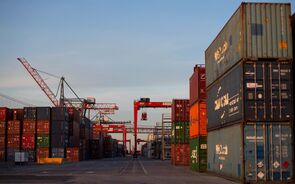Cramer: "The Road Out of Greece"
2 mensagens
|Página 1 de 1
Re: Cramer: "The Road Out of Greece"
Ulisses Pereira Escreveu:[b]"The Road Out of Greece"
(...)
Fareed Zakaria, in a great Op-Ed piece in the Washington Post this morning, makes it clear that we are not Greece. "Perhaps the largest difference is that the United States has solid growth prospects, based on economics, technological productivity and demography," he writes.
(...)
Depois de terem distribuído o lixo financeiro por todo o mundo, ficou mais fácil superar as dívidas!!!
Mas para além disso, a Califórnia, já recuperou, ou está no caminho da Grécia?
- Mensagens: 6450
- Registado: 7/4/2007 17:13
- Localização: Algarve
Cramer: "The Road Out of Greece"
"The Road Out of Greece"
By Jim Cramer
RealMoney Columnist
5/24/2010 10:49 AM EDT
"We aren't Greece. But no one says we are Greece. We are stronger than Europe. But no one disputes we can be brought down by Greece and its domino effect. We are enjoying a recovery, but their decline will blunt our recovery.
The stories are all over the map, and that's the real problem. We don't know how big is big. As the Financial Times pointed out this morning, Greece has a huge amount of debt -- $350 billion, which dwarfs the defaults by Russia in 1998 and Argentina in 2001 combined. It's true that the dollar's value has depreciated since those previous defaults, but that doesn't change the sheer size of Greece's problems.
Fareed Zakaria, in a great Op-Ed piece in the Washington Post this morning, makes it clear that we are not Greece. "Perhaps the largest difference is that the United States has solid growth prospects, based on economics, technological productivity and demography," he writes.
But so what, you might say, because, as the front page of the Post says, "...the knife-edge psychology currently governing global markets has put the future of the U.S. economic recovery in the hands of politicians in an assortment of European capitals. If one or more fail to make the expected progress on cutting budges, restructuring economies or boosting growth, it could drain confidence in a broad and unsettling way. Credit markets worldwide could lock up and throw the global economy back into recession."
I agree with the front page of the Post. We aren't strong enough to withstand a Greece default. However, who says we have to have one? Aren't the Europeans united in trying to stop that?
Boom, that's the real issue. Of course, they aren't united, not at all. The only way I could explain Friday's rally, besides pure mechanical phoniness, was to believe that the European Central Bank's president, Jean-Claude Trichet, would say, "We are going to cut rates to zero to be sure we can promote growth and back Greece." He didn't. Germany's unilateral move to ban shorting was another sign that they are, not only disunited over there, but, somehow acting at cross-purposes.
There are mitigating factors. We know that China sees what we see, and it isn't going to go down without a fight. It won't let itself slip into a recession, so it will reorient to slower growth, away from real estate and toward manufacturing and domestic consumption. That's why I believe oil prices can stabilize. I am watching copper prices and Baltic freight rates to measure those efforts.
Nevertheless, we are already feeling the effect of the currency collapse. A good piece in the FT this morning reminds me of the earnings-estimate cuts ahead, as did Salesforce.com's (CRM - commentary - Trade Now) conference call. The cuts are pennies, but it's not the numbers that matter.
That's why I come back to the FT's terrific column from this morning with the headline: "Known Unknowns." To get of this jam, we know that we need to have:
1. European governments unite behind a strategy to cut the likelihood of a Greece default, which is the real risk;
2. No cessation of U.S. economic growth, as measured by employment claims;
3. Some continued signs, beyond the stock-market rally in Shanghai, that China understands the problems and wants to help, not hurt.
The hard issue here is that none of this depends on what we do. We are not totally at the mercy of others, but Europe's downside far outweighs any upside we can generate. That means we can't get bullish. But do we deserve to get hammered? No. There is a path out of this jam, otherwise I would be smack in the Dow 8000 camp.
I believe there's a decent chance we will walk that road, where the individual earnings risk becomes the challenge, rather than the systemic risk of a crushing blow that sends the world back into a Great Recession, where we do relatively better than others because of our corporate balance sheets -- meaning we just lose less. It's not optimum, but also not hopeless.
Random musings: It may be harder to get hammered today, with copper, gold and oil going up. "
(in www.realmoney.com)
By Jim Cramer
RealMoney Columnist
5/24/2010 10:49 AM EDT
"We aren't Greece. But no one says we are Greece. We are stronger than Europe. But no one disputes we can be brought down by Greece and its domino effect. We are enjoying a recovery, but their decline will blunt our recovery.
The stories are all over the map, and that's the real problem. We don't know how big is big. As the Financial Times pointed out this morning, Greece has a huge amount of debt -- $350 billion, which dwarfs the defaults by Russia in 1998 and Argentina in 2001 combined. It's true that the dollar's value has depreciated since those previous defaults, but that doesn't change the sheer size of Greece's problems.
Fareed Zakaria, in a great Op-Ed piece in the Washington Post this morning, makes it clear that we are not Greece. "Perhaps the largest difference is that the United States has solid growth prospects, based on economics, technological productivity and demography," he writes.
But so what, you might say, because, as the front page of the Post says, "...the knife-edge psychology currently governing global markets has put the future of the U.S. economic recovery in the hands of politicians in an assortment of European capitals. If one or more fail to make the expected progress on cutting budges, restructuring economies or boosting growth, it could drain confidence in a broad and unsettling way. Credit markets worldwide could lock up and throw the global economy back into recession."
I agree with the front page of the Post. We aren't strong enough to withstand a Greece default. However, who says we have to have one? Aren't the Europeans united in trying to stop that?
Boom, that's the real issue. Of course, they aren't united, not at all. The only way I could explain Friday's rally, besides pure mechanical phoniness, was to believe that the European Central Bank's president, Jean-Claude Trichet, would say, "We are going to cut rates to zero to be sure we can promote growth and back Greece." He didn't. Germany's unilateral move to ban shorting was another sign that they are, not only disunited over there, but, somehow acting at cross-purposes.
There are mitigating factors. We know that China sees what we see, and it isn't going to go down without a fight. It won't let itself slip into a recession, so it will reorient to slower growth, away from real estate and toward manufacturing and domestic consumption. That's why I believe oil prices can stabilize. I am watching copper prices and Baltic freight rates to measure those efforts.
Nevertheless, we are already feeling the effect of the currency collapse. A good piece in the FT this morning reminds me of the earnings-estimate cuts ahead, as did Salesforce.com's (CRM - commentary - Trade Now) conference call. The cuts are pennies, but it's not the numbers that matter.
That's why I come back to the FT's terrific column from this morning with the headline: "Known Unknowns." To get of this jam, we know that we need to have:
1. European governments unite behind a strategy to cut the likelihood of a Greece default, which is the real risk;
2. No cessation of U.S. economic growth, as measured by employment claims;
3. Some continued signs, beyond the stock-market rally in Shanghai, that China understands the problems and wants to help, not hurt.
The hard issue here is that none of this depends on what we do. We are not totally at the mercy of others, but Europe's downside far outweighs any upside we can generate. That means we can't get bullish. But do we deserve to get hammered? No. There is a path out of this jam, otherwise I would be smack in the Dow 8000 camp.
I believe there's a decent chance we will walk that road, where the individual earnings risk becomes the challenge, rather than the systemic risk of a crushing blow that sends the world back into a Great Recession, where we do relatively better than others because of our corporate balance sheets -- meaning we just lose less. It's not optimum, but also not hopeless.
Random musings: It may be harder to get hammered today, with copper, gold and oil going up. "
(in www.realmoney.com)
2 mensagens
|Página 1 de 1
Quem está ligado:
Utilizadores a ver este Fórum: AlfaTrader, Artur Jorge, Bing [Bot], Burbano, eurowire.financeiro, Ferreiratrade, Kury Yozo, m-m, malakas, Mavericks7, MR32, nunorpsilva, O Magriço, PAULOJOAO, SerCyc, Simplório e 113 visitantes



